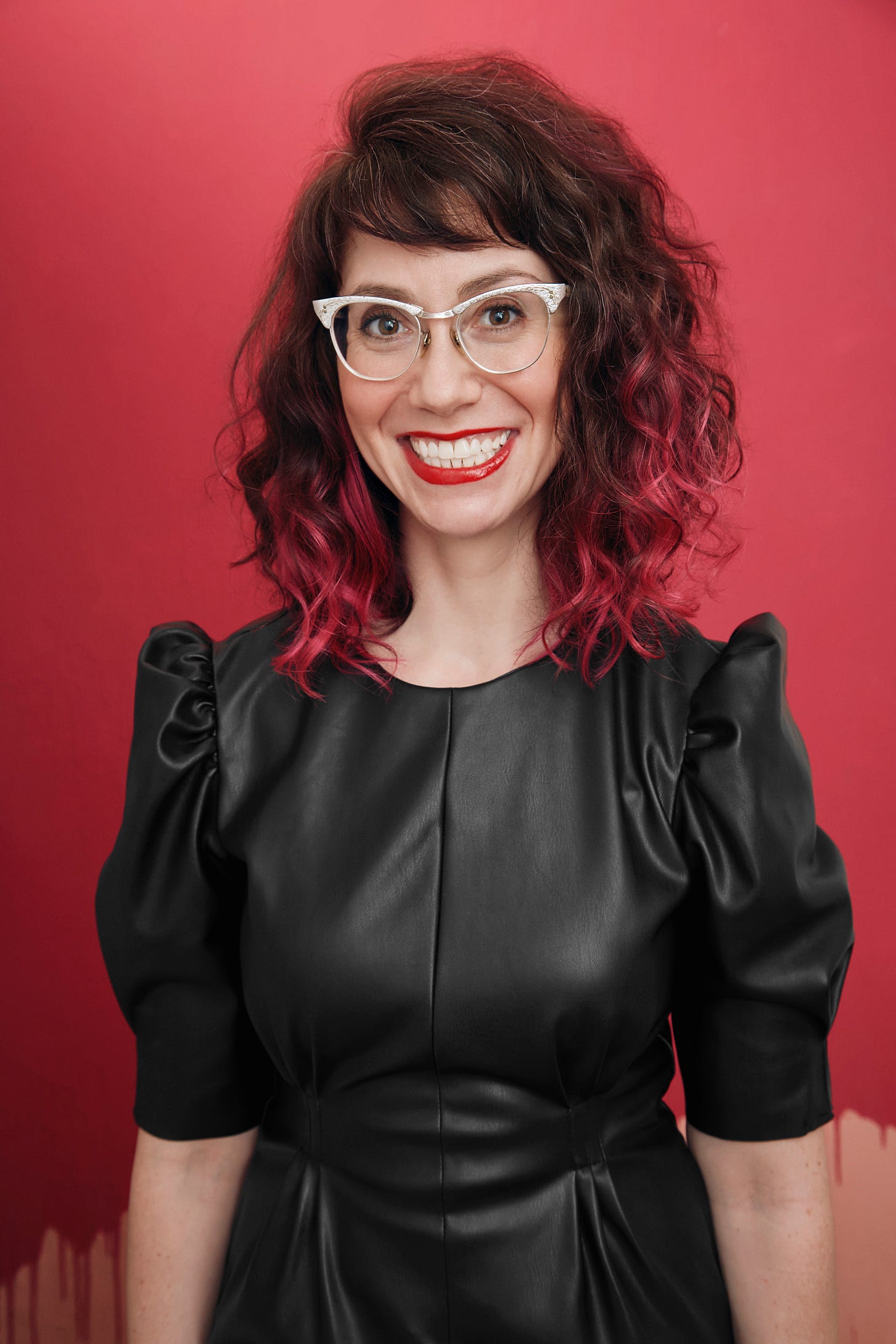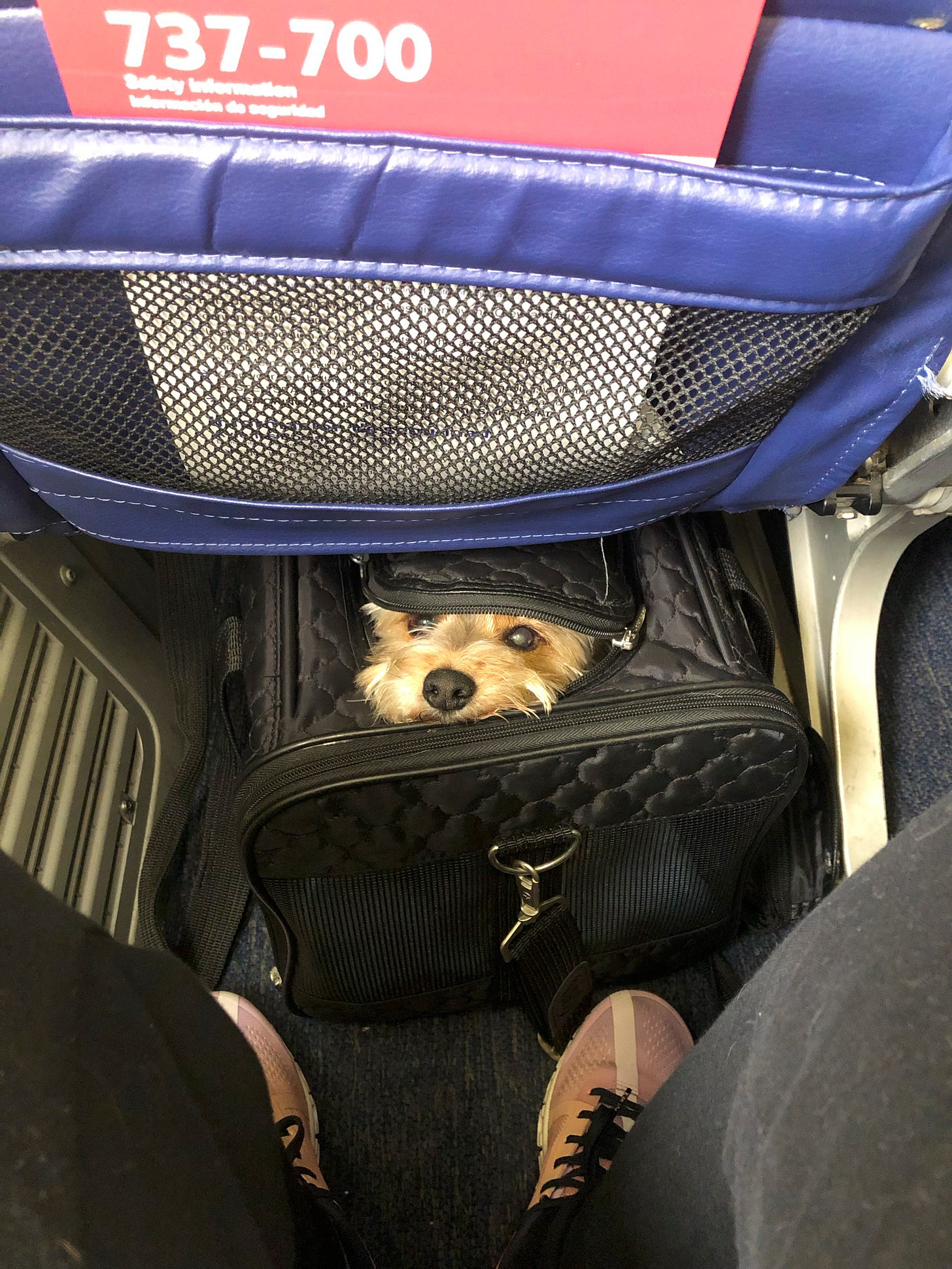Purchase: Hysterical
Elissa Bassist is the editor of the “Funny Women” column on The Rumpus and the author of the award-deserving memoir Hysterical, available now. As a founding contributor to The Rumpus, she’s written cultural and personal criticism since the website launched in 2009. She teaches humor writing at The New School, Catapult, 92NY, and Lighthouse Writers Workshop, and she is probably her therapist's favorite.
Editor’s Note
Welcome to the first column of THE THREE after the holiday madness. I am happy to introduce you to Elissa Bassist and her memoir, HYSTERICAL- a book I read and then decided I needed to give to a few women I know, including my 20-year-old daughter. It’s a story about all women in the U.S., a story about how our historical silence in the face of men’s behaviors has become a chokehold on women’s emotional and physical health, about gender dynamics in the workplace, about being a writer and what we are allowed and allow ourselves to write about, about female courage and healing. It’s just wonderful. I hope you buy a copy and support this funny and gifted woman. -Maggie May
POP UP QUESTIONS
The writer picks five out of ten pop-up questions and answers them.
What do you think about when you are awake at 3 am?
Every single fight I had in middle school. And then every single fight I’ve had since.
What is a quote that has endured in your mind?
From Adaptation: “‘I loved Sarah, Charles. It was mine, that love. I owned it. Even Sarah didn't have the right to take it away. I can love whoever I want.’
‘But she thought you were pathetic.’
‘That was her business, not mine. You are what you love, not what loves you. That's what I decided a long time ago.’”
This quotation has justified all of my unrequited loves, non-relationships, and textationships. It has also helped me own my feelings and write about them without shame.
What occupies your mind most often on being a woman in America?
It’s tough to narrow it down. Right now: that asking for help is no longer an option for many people who can get pregnant. And I’m not overreacting: The National Right to Life Committee wants to make it a felony to provide information about abortion pills (online, by phone, in person, in public, in private), and it published model legislation to do so. The University of Idaho recently banned “promoting” and “advertising” abortion and contraception to prevent pregnancy (condoms are okay only if they’re used for fun), and informing university students about reproductive health care may result in firing, felony charges, and incarceration.
BTW, here’s how to get abortion pills, courtesy of activists vowing mass defiance:
Aid Access: “Online consult for abortion pills by mail. Aid Access supports women, girls, trans men, nonbinary and all people with an unwanted pregnancy to access an abortion or miscarriage treatment.”
Plan C: “Plan C provides up-to-date information on how people in the U.S. are accessing at-home abortion pill options online.”
We Testify shares self-managed abortion info on its site and social media.
What is your favorite bit of writer lore or (not harmful) gossip?
I’d like to answer the opposite of this question. “Writer lore” I cannot stand is that writers write easily, quickly, and to great acclaim. In truth, writing is hard and it takes forever (10x as long as you think) and mostly it’s rejected or deleted. [In a preacher’s voice] Let us normalize toiling (vs. god-given talent). And normalize writing slowly and wasting time. And normalize rejection and deleting/revision. Instead of assuming or expecting writers to write one book in two years, let’s make it ten, with hundreds of rejections along the way.
What philosophy, religion or school of thought has given you something real, and what is that real thing?
Don’t hate me, but my favorite book in high school was The Fountainhead by Ayn Rand, which would end up ruining my sex life. Rand invented “objectivism,” the made-up philosophy that a human being is a heroic being and personal happiness is life’s moral purpose and work purifies the spirit, and also that there’s an objective reality we perceive through our senses, and that this faculty, called reason, is the shit. (Also something about free markets and laissez-faire capitalism or whatever…I was a teenager when I read it and many of the motifs and nuances eluded me.) What stuck with me the most was on p. 400, which I memorized: “To say ‘I love you’ one must first know how to say the ‘I.’”
PHOTO ROLL STORY
The writer picks a photo from her phone and tells us about it.
Here’s my dog/son/father/husband Benny Theodore Bassist traveling with me on my Hysterical book tour in the fall. In this photo it’s been an unknown number of hours after he (a rescue, formerly abused, old) reacted when an United Airlines agent tried to remove an old tag from his carrier without asking, and he bit her coat, for which she went to the ER and called the police (who arrived with wearing guns) and animal control (who took a mug shot of Benny) and also kicked me off all my United flights during my 5-state book tour and then, weeks later, hired legal representation. Benny has 9 teeth and 1 broken eye, and Southwest Airlines accepted him and took us to Colorado less than 12 hours after I was on my knees weeping, literally hysterical, begging United to not take away/euthanize the love of my life.
THE INTERVIEW
The writer answers questions about her life and work.
HYSTERICAL is such a great title, and a fitting one, with many connotations for women. As you wrote your story about losing your voice as a woman in relationships and at work and with doctors, and those effects on you, did you find it hard to be bold? It's so easy to read a book and feel like it's not a big deal that the author wrote this or that story, but when you are the one writing it, it can feel scary because you don't know what the response or repercussions will be.
I had to write as if everyone I know were illiterate. As if no one would or could read what I was writing. Otherwise, the imagined response and imagined repercussions would ensure my silence. Real and imagined threats are designed to shut us up, and they’re effective because we internalize them–so no one needs to say anything to us for us to be afraid that they will and that it will be bad. The moments when it felt hard to be bold–those were also the moments when I knew a story was too good not to tell. My test is: What do I not want people I went to middle school with to read about me? Those are the best stories, the ones that scare you a little bit to share, the wounds where the light enters.
What surprised you about yourself or your story once it was all down on paper?
That I know more than I think I do. That I’m stronger than I’d believed I was. That I’m angrier than I’d guessed.
In HYSTERICAL there are more than a few stories about the way that men manipulated, gaslighted, and controlled you, and how that silenced you, and how that silence intertwined with your health issues. As someone who has a similar mix, I loved that you didn't draw a blanket conclusion, and you weren't afraid to say: they aren't unrelated, but they aren't chicken and egg, either. Where are you with that healing process now?
As long as sexism and misogyny exist, no one will be healed. But “change,” as my self-help books tell me, happens first through awareness of how fucked up everything is. This awareness–which I describe in detail in HYSTERICAL–helps me stay away from what can make me sick, in body/mind/spirit/vagina.
Now I think of “recovering” as less a “state of being” than a practice–a lesson to relearn, a realization to re-experience, a memoir to rewrite, etc.
You mention in the book a few modalities that were particularly helpful for you. Will you share them?
A: Yes. I flirted with a few “talking cures,” like:
Psychotherapy, Freud’s OG way to cure hysterical patients—a.k.a. women with acid memories and hideous feelings that tainted the soul—by inducing them to talk about what they couldn’t, with the hope that the mind and the mouth, this time, were up to it.
EMDR therapy, where I narrated traumatic scenes while a therapist guided me in sensory stimulation meant to move trauma from the present into the past. EMDR works based on “the mindbody likeness,” i.e. just as repeated physical injury doesn’t heal, repeated mental injury won’t either, and trauma is an injury to the psyche that “behaves like an open wound.”
“Expressive writing,” where I wrote about the darkest shit that had ever happened to me and how it made me feel and its lifelong impact. Many scientific studies on expressive writing return the same results: improved health from writing correlates with a better immune system, an improvement on par with antidepressants, meditation, physical therapy, opioids, and more.
For women readers who are struggling with finding their own voice and being brave in a world that doesn't always reward courage- especially female courage- what would you say to them? Besides “read my book!”
First of all, READ MY BOOK! I put everything I learned about voice and bravery and The Little Mermaid into it.
I had learned silence, as every girl does, and was routinely silenced, as every woman is, and then I opted for silence. It just wasn’t cute to wear my heart on my sleeve. My words had not mattered so much and my voice had grated and my attitude had incriminated me so often that silence cured me of myself. Except that it made me sick in every sense of the word. To find my voice I had to risk. Risk being loud. Risk sending too many text messages. Risk not being polite. Risk being real. Risk whatever there is to risk if only I say what I need to say.
We can’t be silent because we’re afraid to make a mistake. The real mistake is to say nothing. It is violence or self-violence to do so.
Tell us about the process of writing this book. Practically, what did it look like, and emotionally, what did it feel like?
Practically, it looked like The Pomodoro Method. And using internet blocker apps like Freedom and Self-Control.
Emotionally, it felt like the best of times, it felt like the worst of times, it was a season of light, it was a season of darkness, it was the spring of hope, it was the winter of despair, etc.
How has Covid changed your life?
Covid broke a few spells and societal long-cons: I stopped shaving my legs, stopped covering up my zits, and stopped looking in the mirror.
What are you working on now?
Literally this interview. Which is to say, I’m working on promoting the book that I started writing in 2010. I used to think that writing a book would be the hard part; then I realized that selling a book is harder; and now I know that promoting it is the hardest. Promoting isn’t far from begging and tricking total strangers into spending $30 on a book about me and my ex-boyfriends (and the sexist institutions of medicine, media & entertainment, and publishing).







I loved this interview! And I love HYSTERICAL!